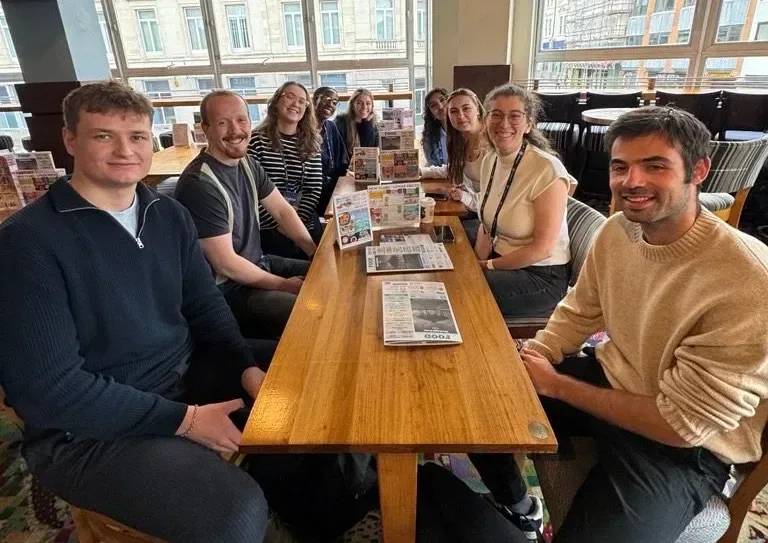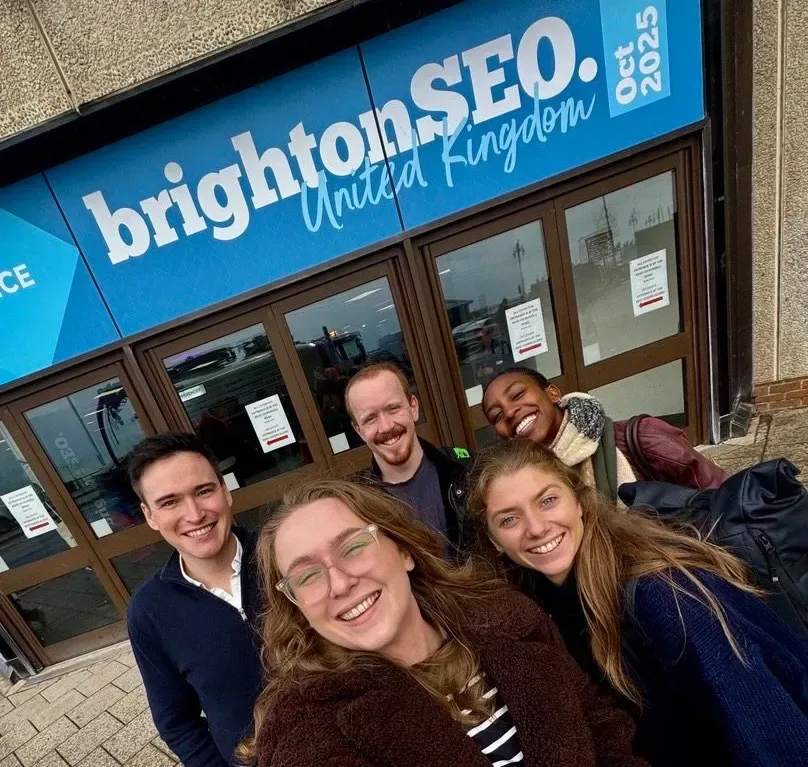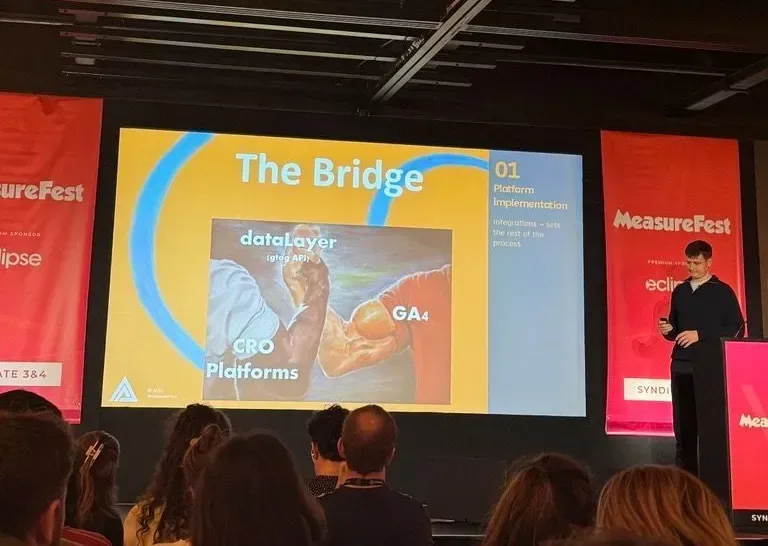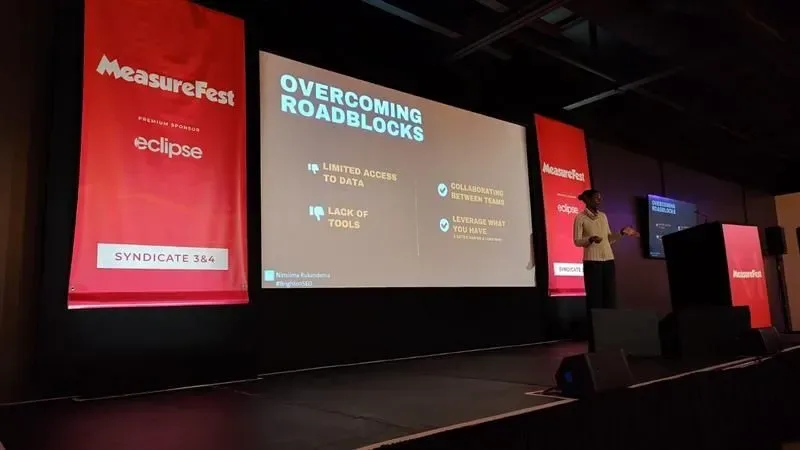
The team at Hookflash, along with thousands of other SEOs headed to BrightonSEO last week and amongst the familiar setting of the Brighton Centre, we saw some key themes coming up: From AI search and human-centered content, to the growth of social media in search. We’re summarising the team’s highlights and key takeaways that are shaping the industry and our work here at Hookflash.
Missed BrightonSEO in April? Take a look at the last BrightonSEO wrap up we wrote for the spring event .

AI SEO, AIO, GEO: Whatever It’s Called
You might think BrightonSEO should be renamed BrightonAIO if you looked at the line up of talks available but all the speakers could agree on one thing - we still have no idea what to call AI optimisation. AI SEO, GEO, AIO, no one knows. Nevertheless, all of the speakers shared a range of insightful studies, talks and ideas as AI continues to be a key challenge in the industry.
Jerome Salomon kicked off the conference by exploring AI as a game that will go on without you, whether you decide to play or not. So while we need to get on board as SEOs, we’re used to a data-driven game but unlike SEO, we don’t have an AI search console to turn to. However, hope is not lost as we can use log files to track AI bot traffic and make inferences off the back of this data. By reviewing training bots, search bots and user bots, we can use this data as a metric for visibility in AI.
Malte Landwehr also took a data-driven approach but emphasised the need to understand the sources LLMs are learning from and therefore, where we need to focus our efforts to shape what is showing up about our brands. He found that AIOs are pulling from all sorts of sources: Yelp, Facebook, YouTube, Instagram, TikTok. Individual platforms have their own sources too, with Perplexity pulling from Uber Eats and Trip Advisor, and AI mode referencing Yelp and Reddit.
One of the trickiest things to navigate when it comes to AI is letting AI make you average, as highlighted by Tom Vaughton . While it’s an incredible resource for scale, speed and data, it won’t give us differentiation, strategy or more importantly, results that matter. So rather than becoming reliant on AI and losing our critical thinking, we can instead use AI to critique, improve and challenge our work. By having these models give alternate perspectives and provide new ideas we can enhance our existing ideas with new concepts and designs to provide a better experience for our clients. Overall, there’s no harm in learning and challenging your ideas, so using AI to prompt, provoke and ultimately build on ideation provides a better experience for all.

The Expanding Search Universe
Although AI is the trendy topic right now, the search world is evolving in more ways than one. In fact, search is happening in more places than just Google and ChatGPT; people are headed to social media, forums, and video too.
One of the team’s absolute highlights of the conference was Ashley Lidell’s talk on connecting search across brand and social, the term coined “Search Everywhere”. The focus here was on the fact that search is no longer just about creating good content (still obviously important!) but also about appearing in more channels. As is becoming more and more apparent, brand mentions are a key indicator of LLM success, with social and broader channel presence providing social proof for brands.
One of the key points Ashely raised though, is that whilst LLM search is growing, its not actually harming Google, its expanding it! Before using ChatGPT users averaged 10.5 Google sessions a week, whilst afterwards they used GPT for 5 sessions and Google for 12.6. This uptick in usage for both speaks volumes to the need to be present everywhere. Search is expanding so we must broaden our appearance across sources in order to be the preferred option.
Unsurprisingly TikTok shop was a topic of conversation too, with Amanda Easter sharing how TikTok shop is revolutionising e-commerce and product discoverability. Instead of searching, people are scrolling; TikTok’s algorithm is telling people want they want to buy before they know - it’s predictive not reactive like Google.
This was echoed by Rachel Murdoch who dared to question: are websites dead? With the rise in zero click search, ChatGPT shopping, TikTok Shop and agentic shopping, we see decreasing proportions of traffic who actually engage with websites. As a result, we need to continually adapt and review our efforts and KPIs, as well as ensuring we create brands that are more than just a website - create experiences and be memorable for humans.

Human-Centered Content That Lasts
The need for human-centered content and design was a core message that rang true in many of the talks at this autumn’s BrightonSEO: content written by humans, for humans.
This was particularly emphasised in Will Slater ’s creative talk about why you shouldn’t use AI to write. Good writing comes from empathy, feeling and human connection - none of which AI has. So when you write, imagine your ideal client and write them a letter instead of writing for AI.
Not only is human-written content better for humans, but its better for Google too, as proven by Ed Cole s' experiment when answering the question: “Can you scale LLM traffic through AI?” In this experiment, Ed’s team discovered that Google prefers human written content 86% of the time vs AI written content.
However, he did also discover that AI written content is 41% more likely to be cited in LLM search - but at what cost and to what benefit? Although AI content is more likely to be cited by LLMs, it did not result in an increase in site traffic and may contribute to the overall decline in content quality across the internet.
And where do users go when they don’t want generic AI answers? They turn to human-led platforms like Reddit, YouTube and TikTok as explored by Jane Fulcher . Brands therefore should be seriously considering activity on these platforms and consider how they can encourage user generated content.
But of course, content is only as good as the attention you give it. Rich George raised an interesting concern about content decay being a threat to website performance. With content quality declining naturally as relevancy and accuracy goes down over time, we need to have regular health checks for our content. He presented a fantastic keep/kill/merge/refresh model to make sure our content continues to meet EEAT, prevent ranking drops and support AI rankings with fresh content.

User Experience & CRO
When it comes to on-site user experience, two of our own CRO specialists here at Hookflash also delivered incredible talks.
Our very own Ninsiima Rukandema , Senior Experimentation Analyst, explored the depth of understanding gained when combining Qualitative and Quantitative sources of data in CRO strategies. Leveraging her background in social sciences, Ninsiima bought a unique perspective for brands, encouraging them to understand their consumers behavior on site and optimise this through testing. By leveraging both qual and quant data, brands can improve their user experience on site and tangible ROI.
How do we get this data? By enhancing these CRO tests with GA4 measurement as shared by our own Joe Gregson , a CRO developer here at Hookflash. He explored how we can seamlessly integrate CRO platforms with GA4 to provide informative data both before and after running tests.
Illustrating this perfectly was Pete Helsop who explored the importance of user experience by exploring how website landing pages are actually closer to traditional hospitality than we think. For example, when you arrive on a website its like arriving in a restaurant; The immediate communication showcases whether this is where you should be and spend your money. Similarly, what appetite does the user / customer have to spend, and how can we make sure we are presenting them with a suitable set of options to match this appetite.
Leveraging Tech To Drive SEO Results
We also attended our fair share of more technical presentations too, as the big picture thinking must always be underpinned by good technical SEO .
For example, James Hocking reminded us of the importance of schemas in LLMs and AI search. Unlike Google which can understand Javascript, LLMs can only understand plain text. They can’t “see” websites which is where schema is especially helpful to provide AI bots with clear notes they can easily understand. We’ve seen our own success with this with a recent client seeing a 6.5% increase in daily AIO visibility .
Georgia James also emphasised the importance of hreflang attributes to specify linguistic and geography variations of a webpage. While it can be tricky to implement because of site structures and url structures, they can be extremely beneficial for making it clear to search engines why there are multiple versions of a web page.
Teams, Culture & Relationships for SEO Success
One final theme which really shone through at this year’s BrightonSEO was the importance of cross-team collaboration, client relationships and a growth-focused company culture.
For example Kristina Bergwall took us through the importance of breaking down silos across teams, from social and paid, to SEO and experimentation. Teams are often easily set into their silos, with KPIs aligning to specific streams and resources limited to hit these targets. However, data sharing, collaboration and open communication between channels is crucial to the overall business success which is the absolute objective we seek to achieve.
At Hookflash we had a fantastic case study of this where we helped our client generate £840k of incremental revenue thanks to communications with our client’s paid media partner. Teams that remain siloed and don’t collaborate often miss out on crucial opportunities to make efficiencies to help drive value for their clients, collaborators and crucially themselves.
Cross-team communication is equally as important as client-communitation as highlighted by Jean Dejsuvan who shared her wisdom on turning SEO accounts around when things aren’t going to plan. It’s through clear communication, open conversations and clear timelines that will build trust with clients. Partner this with clear goals, feedback loops and honesty within your team, and this is the magic formula for getting SEO accounts back on track. This was echoed by Ryan White who shared some really practical tips for getting dev teams on board with SEO, such as briefing tickets clearly and making the complex comprehensible.
Wrapping Up
This autumn’s BrightonSEO was a powerful reminder that search is evolving faster than ever but its heart remains the same: understanding people. From AI optimisation to social-first discovery, from human-centred storytelling to seamless user experiences, the future of SEO lies at the intersection of technology, creativity, and empathy.
At Hookflash, we’re excited to continue exploring how these insights shape our work, helping brands stay visible not just in Google, but in every corner of the expanding search universe. Whether it’s optimising for new search frontiers like TikTok and LLMs, or strengthening collaboration across teams, one thing is clear: the brands that win in search will be the ones that think holistically, experiment boldly, and never stop learning.
You may also be interested in


